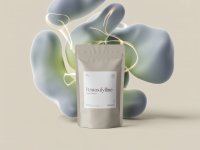
L-Theanine
Description
L-Theanine is a naturally occurring amino acid primarily found in green tea leaves. It's known for its ability to promote relaxation and reduce stress without causing drowsiness. This article provides a comprehensive yet accessible guide to L-Theanine, covering its benefits, dosage, side effects, and more.
Quick Overview: L-Theanine At-a-Glance
- Key Benefit(s): Promotes relaxation, reduces anxiety, improves sleep quality.
- Primary Mechanism: Increases alpha brain wave activity, modulates neurotransmitters like GABA and dopamine.
- Best For: Reducing stress, improving focus when combined with caffeine, enhancing sleep.
- Typical Dose Range: 200-400mg daily, often taken in single or divided doses.
- Key Caution/Consideration: Generally safe, but potential interactions with certain medications exist.
Table of Contents
Categories & Effectiveness
Learn about our rating methodologyBrain Health
Brain Antioxidant Shield
4/10Moderate evidence of effectiveness
Dopamine Support
4/10Moderate evidence of effectiveness
Excitotoxicity Defense
4/10Moderate evidence of effectiveness
Neuro-Repair Support
4/10Moderate evidence of effectiveness
Cognition
Concentration & Focus
7/10Strong evidence of effectiveness
Mental Flexibility
4/10Moderate evidence of effectiveness
Planning & Organization
4/10Moderate evidence of effectiveness
Processing Speed
4/10Moderate evidence of effectiveness
Energy & Alertness
Alertness & Vigilance
4/10Moderate evidence of effectiveness
Mood & Stress
Anxiety Relief
4/10Moderate evidence of effectiveness
Stress Resilience
4/10Moderate evidence of effectiveness
Sleep Quality
Deeper Sleep Quality
7/10Strong evidence of effectiveness
Faster Sleep Onset
7/10Strong evidence of effectiveness
Systemic Health
Anti-Inflammatory (Systemic)
7/10Strong evidence of effectiveness
Immune System Balance
7/10Strong evidence of effectiveness
Liver Protection
7/10Strong evidence of effectiveness
Systemic Antioxidant
7/10Strong evidence of effectiveness
Dosage & Side Effects
Recommended Dosage
Potential Side Effects
Bioavailability & Half-Life
Interactions & Stacks
Recommended Products
BeSerene IR | GABA & L-Theanine | Instant Relief Topical Cream | 1.9 OZ
- Rated 4.4 stars by 36 customers
- Premium quality ingredients
VitaMonk Low Dose Caffeine and Theanine - No Jitters, No Crash- Microdose of Caffeine L Theanine Pills with Caffeine Theanine and Theobromine - 25mg of Caffeine, Caffeine Pills L Theanine - 60 Caps
- Rated 4.3 stars by 158 customers
- Premium quality ingredients
Nutramax Solliquin Calming Behavioral Health Supplement for Large Dogs - with L-Theanine, Magnolia/Phellodendron, and Whey Protein Concentrate, 75 Soft Chews
- Rated 4.0 stars by 2,912 customers
- Premium quality ingredients
As an Amazon Associate we earn from qualifying purchases. Prices and availability are accurate as of the date/time indicated and are subject to change.
Benefits by Use Case
Reduced Anxiety
L-Theanine promotes relaxation and reduces anxiety without causing drowsiness. It may be particularly helpful for individuals experiencing mild to moderate anxiety related to stress or everyday situations.
Improved Focus
L-Theanine can enhance focus and attention, especially when combined with caffeine. This combination is popular for students and professionals seeking a cognitive boost without the jitters associated with caffeine alone.
Enhanced Sleep Quality
L-Theanine can improve sleep quality by promoting relaxation and reducing anxiety. It may help individuals fall asleep faster and experience more restful sleep, particularly those with mild sleep disturbances.
neuroprotection
L-Theanine exhibits neuroprotective properties, potentially benefiting individuals at risk of neurodegenerative diseases. It reduces oxidative stress and inflammation in the brain, protecting against neuronal damage.
Mechanism of Action
Frequently Asked Questions
Where to Buy L-Theanine
Based on quality, price, and customer reviews, here are our top recommended L-Theanine supplements:
Nutramax Solliquin Calming Behavioral Health Supplement for Large Dogs - with L-Theanine, Magnolia/Phellodendron, and Whey Protein Concentrate, 75 Soft Chews
- Rated 4.0 stars by 2,912 customers
- Premium quality ingredients
VitaMonk Low Dose Caffeine and Theanine - No Jitters, No Crash- Microdose of Caffeine L Theanine Pills with Caffeine Theanine and Theobromine - 25mg of Caffeine, Caffeine Pills L Theanine - 60 Caps
- Rated 4.3 stars by 158 customers
- Premium quality ingredients
BeSerene IR | GABA & L-Theanine | Instant Relief Topical Cream | 1.9 OZ
- Rated 4.4 stars by 36 customers
- Premium quality ingredients
As an Amazon Associate we earn from qualifying purchases. Prices and availability are accurate as of the date/time indicated and are subject to change.
Summary & Expert Opinion
For those seeking a deeper understanding, L-Theanine's mechanisms of action are multifaceted. At a fundamental level, it's an analog of the excitatory neurotransmitter glutamate, but it doesn't bind strongly to glutamate receptors. Instead, it primarily influences brain activity by modulating GABA levels. GABA is the brain's primary inhibitory neurotransmitter, and increasing its activity promotes relaxation and reduces neuronal excitability. This action is thought to contribute to L-Theanine's anxiolytic and sleep-promoting effects.
Furthermore, L-Theanine has been shown to increase alpha brain wave activity. These brain waves are associated with a state of relaxed alertness, which may explain why L-Theanine can improve focus without causing drowsiness. This is in contrast to sedative medications or supplements that primarily induce drowsiness by suppressing neuronal activity. The precise mechanisms by which L-Theanine affects neurotransmitter systems and brain wave activity are still being investigated, but it's believed to involve complex interactions with various receptors and signaling pathways in the brain.
Regarding pharmacokinetics, L-Theanine's rapid absorption and relatively short half-life mean that its effects are typically felt within 30-50 minutes and last for 1-2 hours. This makes it a suitable option for individuals seeking short-term relief from anxiety or improved focus for a specific task. However, for long-term benefits, consistent daily use may be necessary. Genetic variations in neurotransmitter systems may influence individual responses to L-Theanine.







